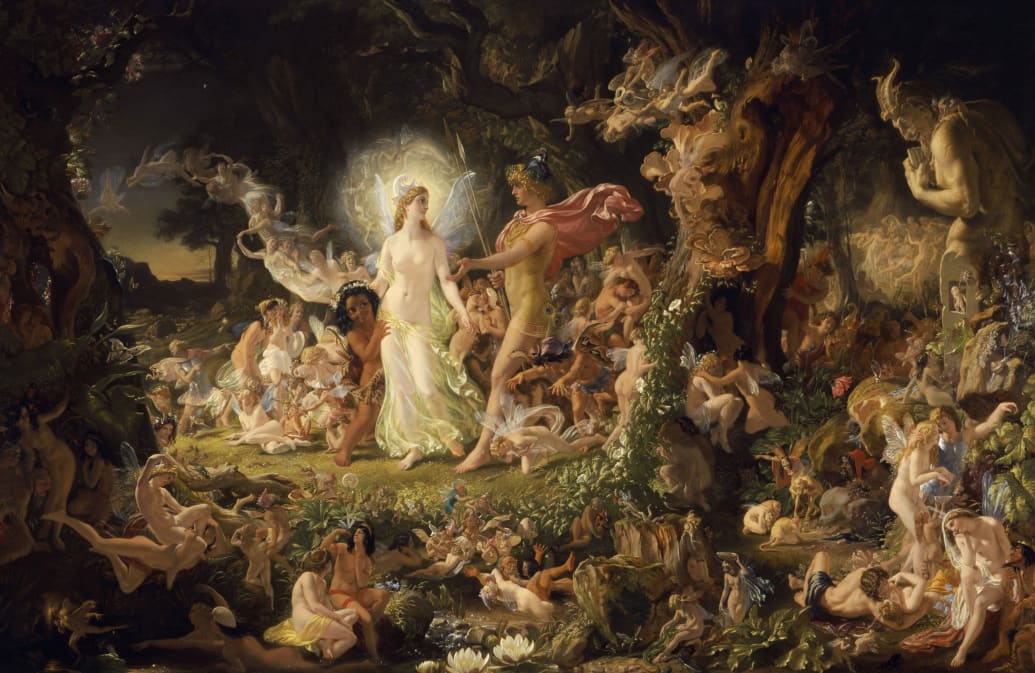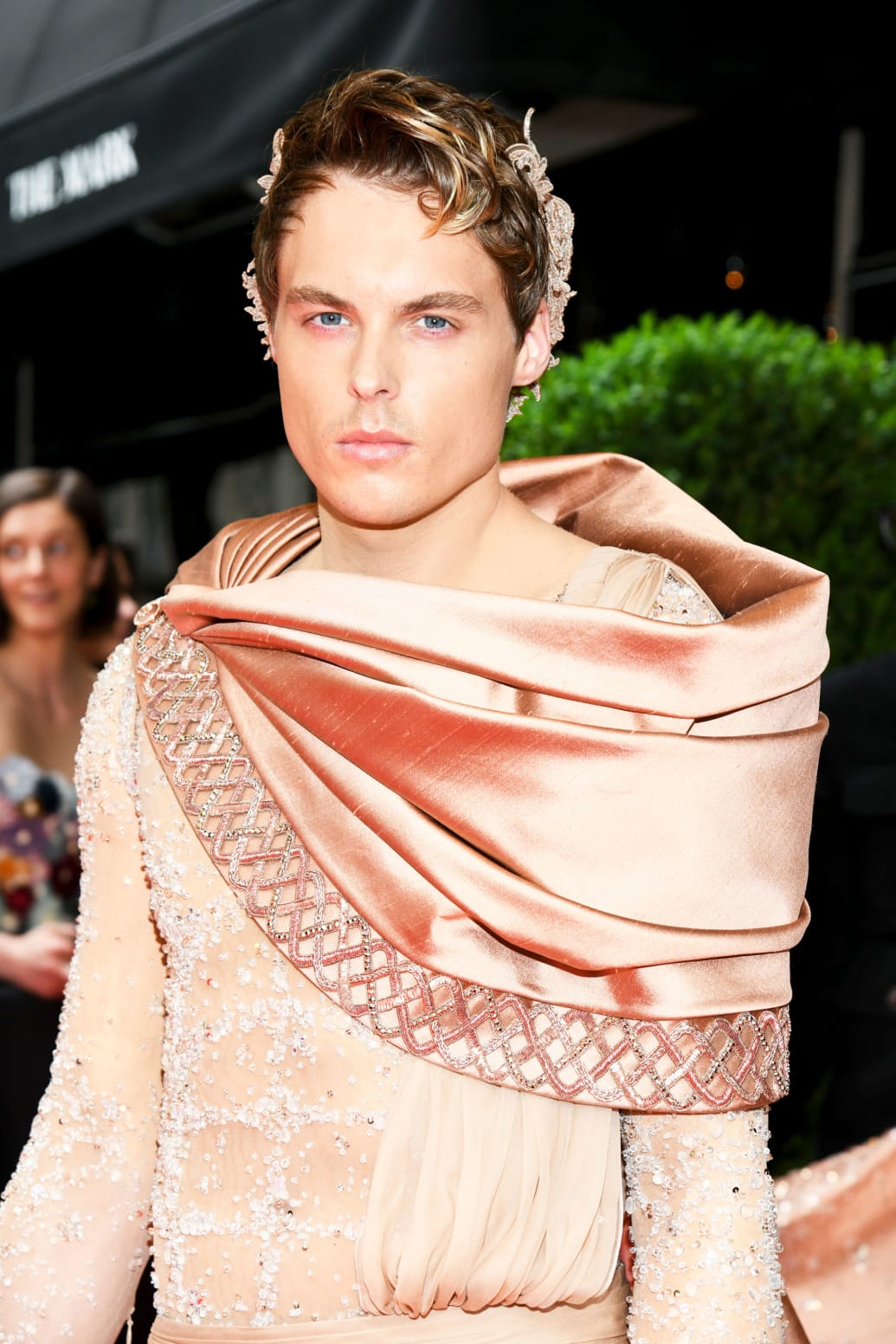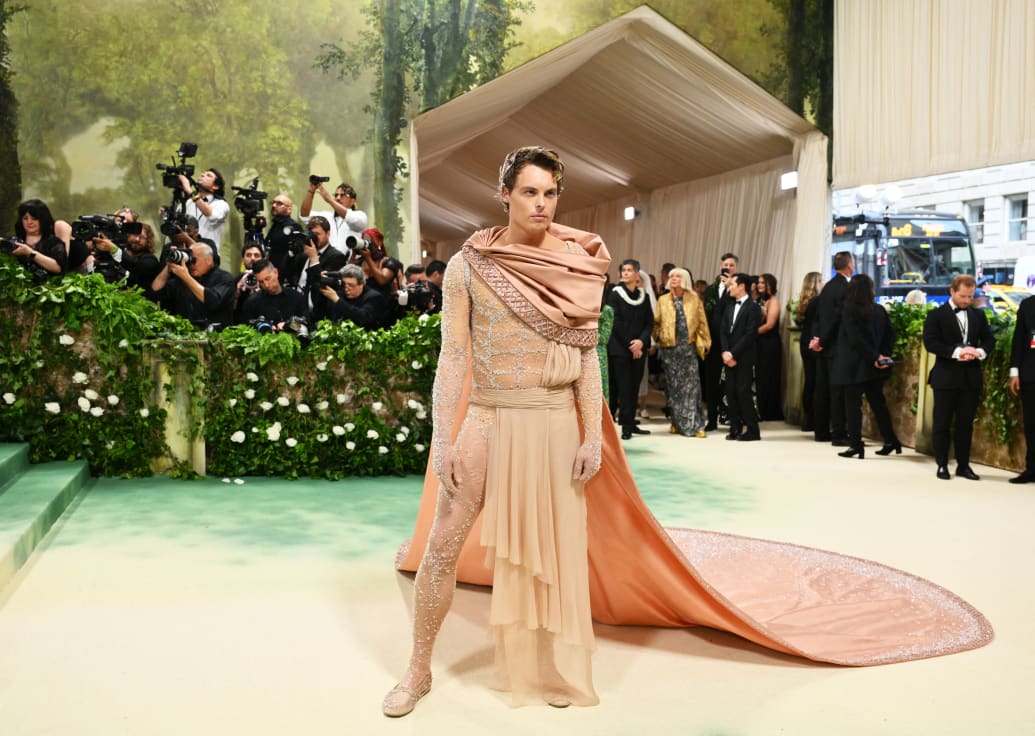Sure, there were lots of models at the . To do so, they spent over four months painstakingly fastening 53,000 crystals to a tulle bodysuit which was then coupled with a chiffon tunic and a silk cape.

Sir Joseph Noel Paton’s The Quarrel of Oberon and Titania, which inspired Witzoe’s outift.
Public Domain
“I was kind of scared when they first talked about doing it because it’s quite a look and it’s quite an inspiration to go after,” Witzøe says. “I think it’s the craziest and most detailed and most beautiful look I’ve ever done.”
“The preparations to get in the costume or the dress was obviously also pretty time-consuming because they wanted to get rid of my tattoos,” he adds. (Witzøe shared a video on his Instagram account showing the laborious process of the designs on his arms and torso being covered up by a retinue of assistants wielding brushes and spray guns.) The result, Witzøe says, was a little uncanny. “I haven’t seen myself without tattoos since I was 16 years old,” he says. “I had to take a photo of it to send to my mom because she’s never been that much of a fan of my tattoos.”
Being transfigured into the physical embodiment of an oil painting fairy king, it turns out, does create certain challenges when you actually have to move around in the real world. “You get a lot of help going up the stairs of course, but after the stairs they kind of let you go,” Witzøe says, referring to the entrance of the Met Gala which presents the stars wearing lavishly impractical outfits with an infamous test of mobility. “Walking around, I tried maybe the first couple of meters to drag it after me—but that did not work. So I kind of had to lift it up and carry it over my arm.”
Witzøe says he was excited to enter the museum to see the Costume Institute’s exhibition, “Sleeping Beauties: Reawakening Fashion.” “When you get it into the museum, it’s longer than I thought, walking around with a cape on my arm. My arm was totally dead for three days after!” he laughs.

Gustav Magnar Witzøe at The Mark Hotel before the 2024 Met Gala: “Sleeping Beauties: Reawakening Fashion” on May 6, 2024 in New York, New York.
Photo by Kristina Bumphrey/WWD via Getty Images
Since leaving behind the glamor of the Met Gala, where he sat next to Willow Smith at the dinner (“She seemed like a really nice person, we had some fun”), Witzøe has spent time with his family back home. “It’s a long way from Manhattan to Frøya I assure you,” Witzøe says.
It was there on the island that, after finishing high school, he spent two years working on salmon farms that now underpin his fabulous riches. “I think it was honestly really, really great,” he says of the work—a view which presumably would not be shared by all of his peers in the fashion elite. “You get to be outside all day. There’s different tasks, like no day is the same as the other one. You get to experience really nice weather, really bad weather. You get to work with various intelligent people.”
Not everyone has such a positive view of the industry, however, including in Nordic countries. In November, Icelandic singer Björk criticized Witzøe’s father’s company when announcing that the profits from a collaboration single with Rosalía would go to opposing salmon farming in open net pens in Iceland—a practice which she called “horrid for the environment” and bringing “immense suffering” to fish. (SalMar says it has “both climate-friendly operations and ambitious climate goals” and highlights its work developing “initiatives and procedures to improve fish welfare” on its website. The Daily Beast has contacted the company for comment.)
“I’m not going to say too much about it,” Witzøe says of the criticisms. “Salmon farming is one of the most effective ways to produce food that we have. But of course all food production in large scales is going to have some problems, and I know that SalMar is working very hard, and I know the whole aquaculture industry is working very hard to do better on those problems.”
“I think we can do something really cool next year too.”
— Gustav Magnar Witzøe
While Witzøe is not involved in running SalMar, he’s the main shareholder of the holding company, Kvarv AS, which owns it. His personal business interests have been more focused on investing, co-founding Wiski Capital in 2017. The firm has pumped cash into Norwegian tech startups, including one which uses cell phones and artificial intelligence to identify the location of gunshots and another which teaches livestock to stay in certain areas with special collars that deliver audio warnings to the animals wearing them.
Most of his time in the next few years, though, will be spent on the W Initiative—his humanitarian foundation which supports projects designed to improve the lives of children and young people. It recently gave funding to GiveDirectly, a nonprofit which puts cash directly into the hands of people living in extreme poverty who can then decide for themselves how to spend the donations.
Despite his many ventures, Witzøe says he is “far from the busiest man in the world.” Which is just as well, as he’ll probably need a decent amount of time to figure out an answer to the question of how the hell he’ll improve on his performance at the Met Gala in 2025.
“Luckily I have an amazing team which is full of creative ideas,” he says. “I’m very happy about the whole team that came with me to New York and of course to Versace who did such an amazing job. I think we can do something really cool next year too.”

